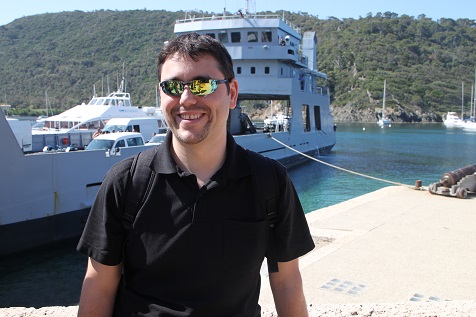
Personnel de recherche CNRS
M. Christophe Lucas
CNRS Research Scientist / Manager of the chemical ecology platformCoordonnées
Parc de Grandmont 37200 TOURS
Bureau Batiment I, salle 0080
- Tél
- 0247367372
- christophe.lucas@univ-tours.fr
- Site internet
- https://www.researchgate.net/profile/Christophe_Lucas
Discipline(s)
Discipline(s) enseignée(s)
Communication chez les insectes, Socialité, Ecologie Chimique.
Thèmes de recherche
Research fields: Chemical ecology, behavioral ecology, behavioral genetics, adaptation.
Keywords: Chemical communication, genetic expression, behavior, polyethism, polyphenism, foraging gene, social conflict, reproduction, insect societies, invasive species.
Biological models: Social insects (termites, ants, wasps, bees), earwig, drosophila, nasonia.
Research projects
My main research projects are to understand complex behaviors of insects and particularly of social insects. How environmental factors are pursued, analyzed and which behavioral responses are influenced? But also, how intra- and interspecific interactions could modify behaviors by changing gene expression? By using tools from chemical ecology and behavioral genetics, my own researches focus on social interactions and their adaptive impacts. So, my studies are based on insect behaviors (recognition, aggressiveness, foraging, parental care, sexual courtship) through the study of chemical communications and gene expression.
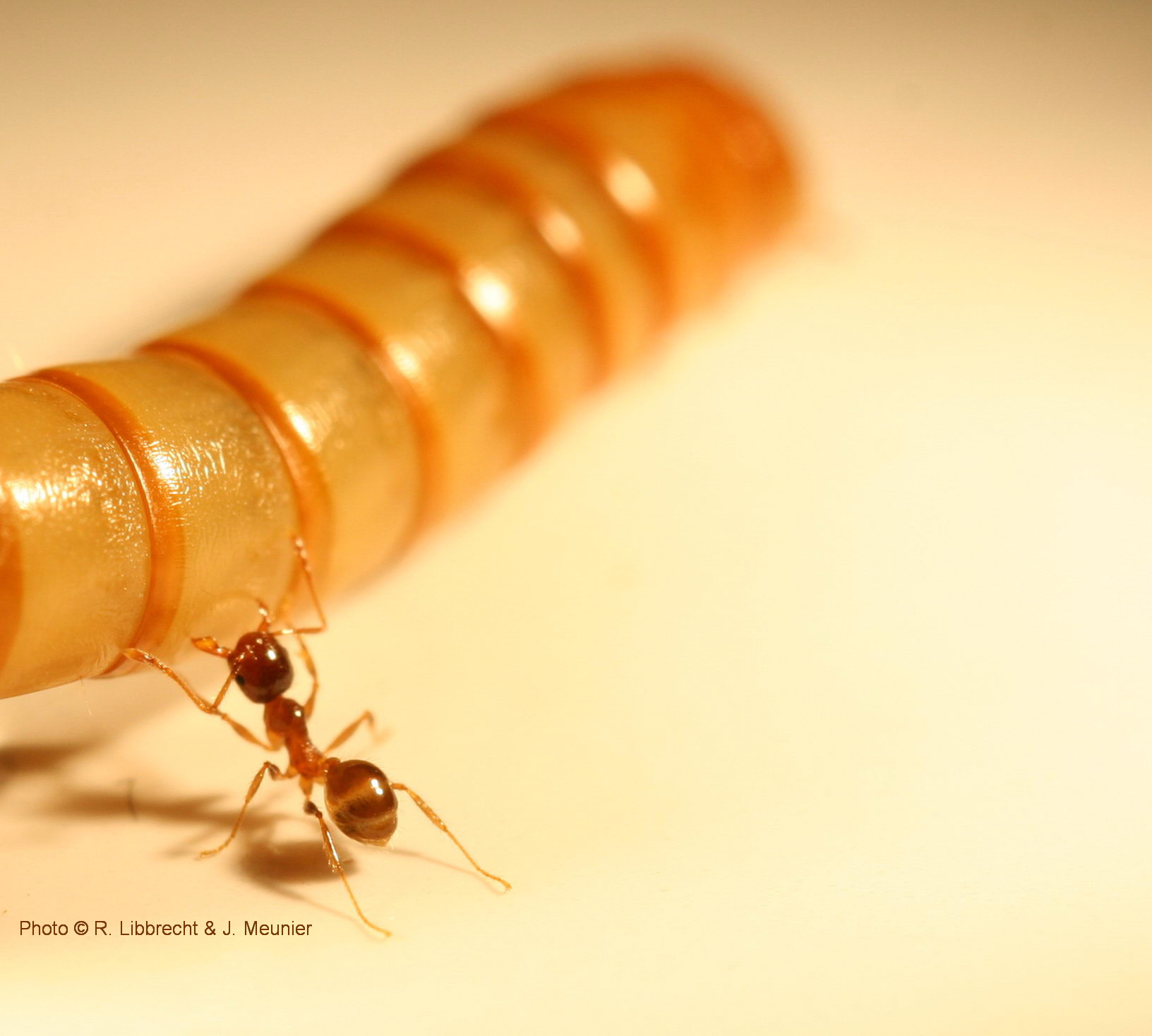
Behaviors and genes expression are under several abiotic and biotic environmental factors which also include social environment. Chemical communication plays an important role in inter-individual interaction in insects and codifies part of the environmental and social information. To unravel communication mechanisms of insects and their evolutions, it is of primary importance to decrypt such chemical information. In more details, I explore questions on behavioral plasticity of insects and in particular in social insects: What are the chemical signals and the genes involved? How environmental factors play a role? What are the consequences of the different reproductives/castes on social organization in insect societies? How such systems are maintained and evolved?
In social insects, the behavioral plasticity and polymorphism are conected to the division of labor throughout the caste system. It influences social organization and raised several questions. 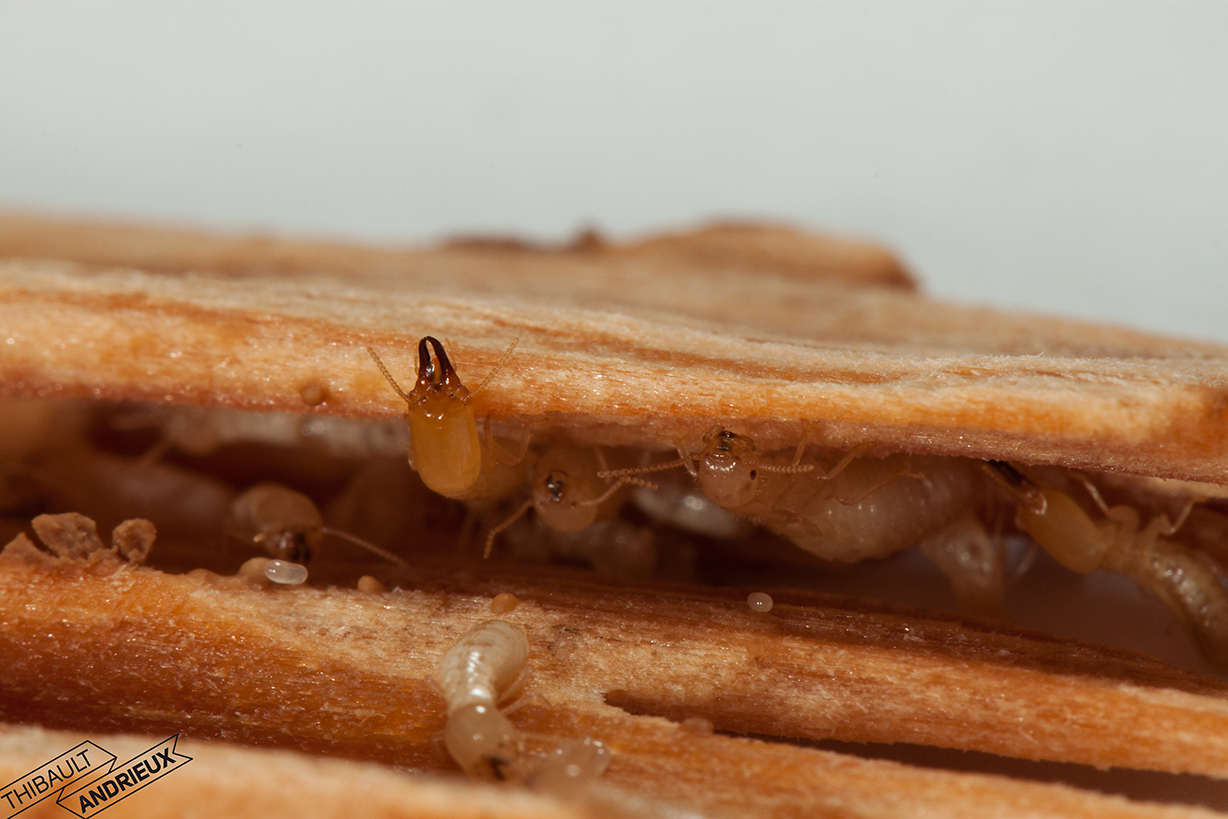
To answers such questions, I study several insect models like termites, ants, earwigs, wasps (solitary and social) and drosophila. They all presents specificity and possess different advantages for my researches. Social insects like termites and ants are organized in complex societies with several social interactions. Nevertheless, eusociality (true sociality) appeared independently in Isopteran (termites) and Hymenopteran (ants, bees and wasps) which gives to termites unique specificities. Concerning drosophila, it is the most studied insect model and its genome is known since a long time, which allow to dissect in details the genetic pathways of its communication system.
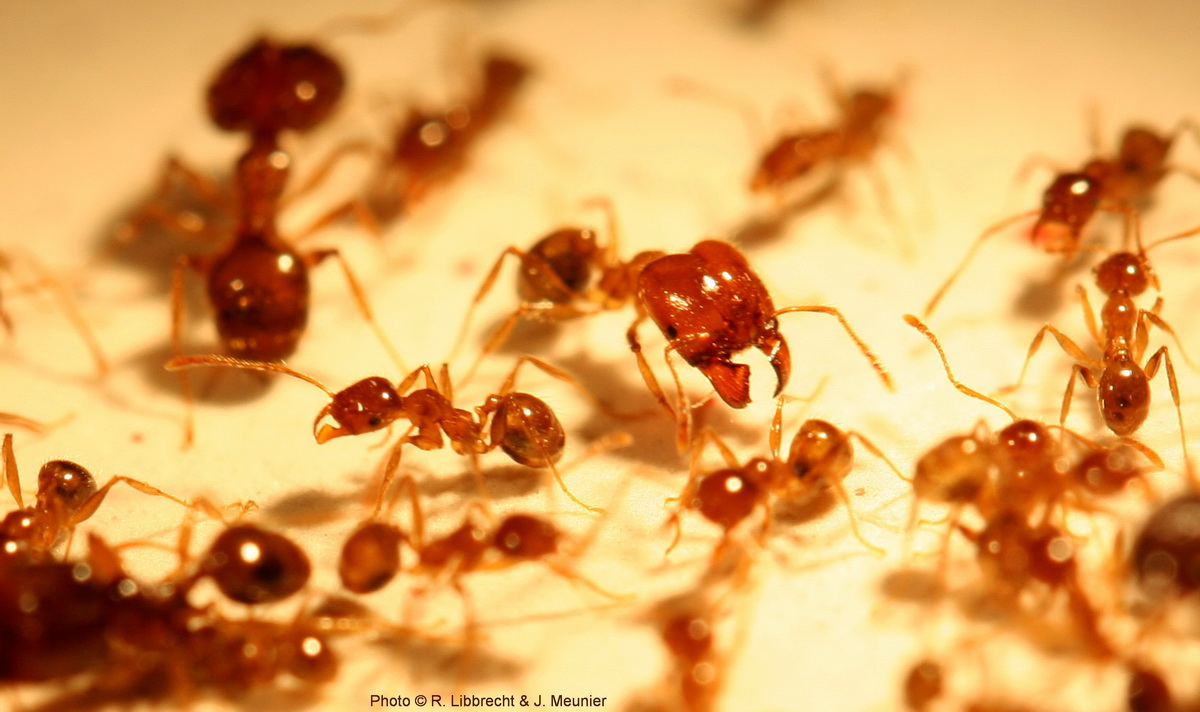
- Chemical analyze and identification: gas chromatography (GC), mass spectrometry (GC-MS/GC-TQ), thin layer chromatography (TLC), liquid chromatography (HPLC), chemical extraction (SPME, SBSE, SHS, DHS, DMDS)
- Genetic expression: quantitative RT-PCR, in situ, RNA interference
- Omics : W4M, Web Apollo, Galaxy, Script Linux
- Experimental behavior: video-tracking, cross-linked reproduction, cross-fostering
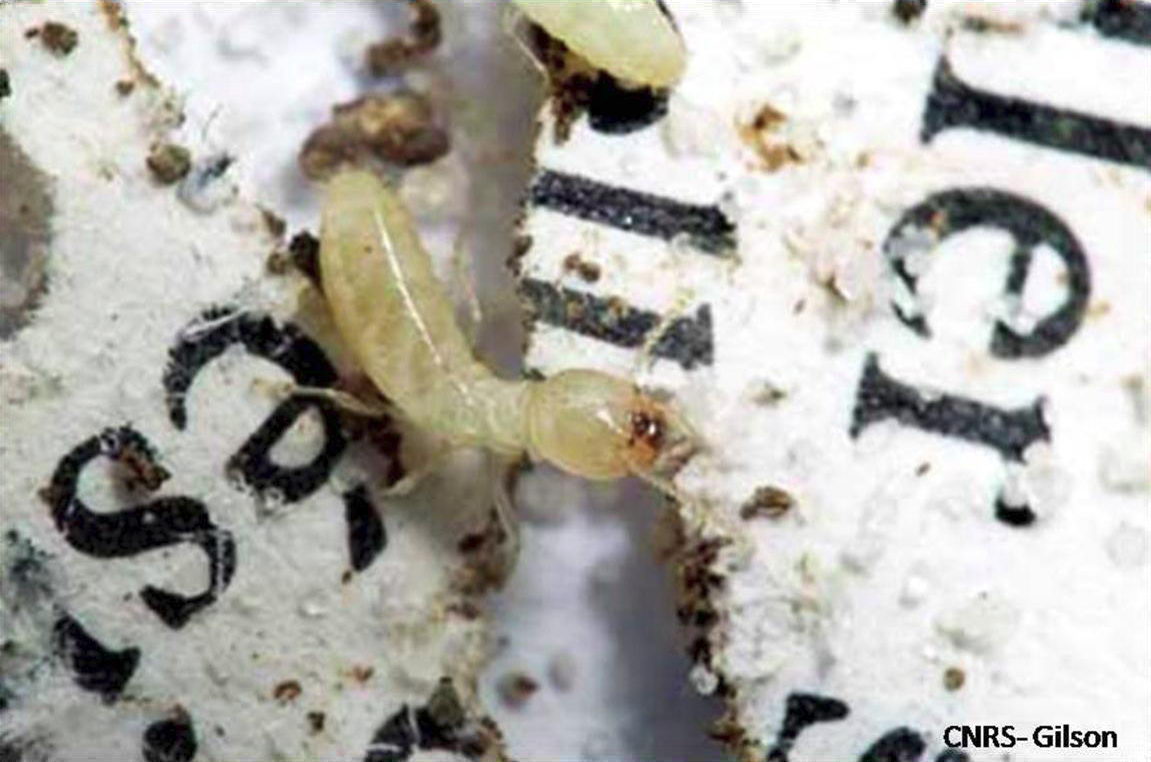
Liens
Union Internationale pour l'Etude des Insectes Sociaux - Section FrançaiseGDR d'écologie chimique
Canadian TV news on "foraging behaviour of Pheidole pallidula"
Activités / CV
Oct. 2010- CNRS Research Scientist (HDR)
University of Tours, France
2010 FNS Senior researcher
University of Lausanne, Suisse
Behavioral genetics in the ant Solenopsis invicta
2007-09 First assistant
University of Lausanne, Suisse (Supervisor: Laurent Keller)
Social structure and genetic expression in the ant Solenopsis invicta
2003-06 Post-doctoral researcher
University of Toronto, Canada (Supervisor: Marla B. Sokolowski)
Molecular mecanisms of the plasticity of social behaviors in the ant Pheidole pallidula
1998-2002 Doctorat ès sciences
University of Paris-Sud (Directors: Jean-Marc Jallon & Dominique Fresneau)
Chemical and behavioral bases of the recognition system in the ponerine ants (Pachycondyla)
Informations complémentaires
Publications (short list)
(Full citations record can be found here)Ruhland F, Gabant G, Toussaint T, Nemcic M, Cadène M, Lucas C (2023)
Reproductives signature revealed by protein profiling and behavioral bioassays in termite.
Scientific Reports. 13:7070
Berville L, Lucas C, Haouzi M, Khalil A, Gévar J, Bagnères AG, Darrouzet E (2023)
Chemical profiles of venom glands in queens, foundresses, gynes, and workers in the hornet Vespa velutina nigrithorax. Calliphora vomitoria.
Comptes Rendus Chimie. 26(2): 1-16
Haouzi M*, Cheng Y*, Berville L, Lucas C, Tam K, Darrouzet E (2023)
Callows have their own odour but not for long: Fast acquisition of the chemical signature in the yellow-legged hornet, Vespa velutina nigrithorax.
Entomologia Generalis
Esparza-Mora MA, Mazumdar T, Jiang S, Radek R, Thiem JN, Feng L, Petrašiūnaitė V, Banasiak R, Golian M, Gleske M, Lucas C, Springer A, Buellesbach J, McMahon DP (2023)
Defensive behavior is linked to altered surface chemistry following infection in a termite society.
Scientific Reports. 13:20606
Fouche Q, Charabidze D, Lucas C (2022)
Synomones in necrophagous larvae of the blow flies Lucilia sericata and Calliphora vomitoria.
Medical and Veterinary Entomology. 2022:1-6
Pailler L, Matte A, Groseiller A, Eyer PA, Ruhland F, Lucas C (2022)
High exploration behavior of termite propagules can enhance invasiveness.
Frontiers in Ecology and Evolution 10:840105
Lucas C, Ben-Shahar Y (2021)
The foraging gene as a modulator of division of labour in social insects.
Journal of Neurogenetics. 10.1080/01677063.2021.1940173
Pailler L, Desvignes S, Ruhland F, Pineirua M, Lucas C (2021)
Vibratory behaviour produces different vibration patterns in presence of reproductives in a subterranean termite species
Scientific Reports 10.1038/s41598-021-88292-7
Vidal M, Königseder F, Giehr J, Schrempf A, Lucas C, Heinze J (2021)
Worker ants promote outbreeding by transporting young queens to alien nests
Communications Biology . 10.1038/s42003-021-02016-1
Ruhland F, Moulin M, Choppin M, Meunier J, Lucas C (2020)
Reproductives and eggs trigger worker vibration in a subterranean termite
Ecology and Evolution. 10 (12): 5892-5898
Brossette L, Meunier J, Dupont S, Bagnères AG, Lucas C (2019)
Unbalanced biparental care during colony foundation in two subterranean termites
Ecology and Evolution. 9 (1): 192-200
Lucas C, Brossette L, Lefloch L, Dupont S, Christidès JP, Bagnères AG (2018)
When predator odour makes groups stronger: effects on behavioral and chemical adaptations in two termite species
Entomological Ecology. 43 (4): 513-524
Brossette L, Bagnères AG, Millot A, Blanchard S, Dupont S, Lucas C (2017)
Termites’ royal cradle: Does foundation success vary between two subterranean species?
Insectes Sociaux. 64 (4): 515-523
Csata E*, Timuș N*, Witek M*, Casacci LP*, Lucas C, Bagnères AG, Sztencel-Jabłonka A, Barbero F, Bonelli S, Rákosy L, Markó B (2017)
Lock-picks: fungal infection facilitates the intrusion of strangers into ant colonies
Scientific Reports. 7: 46323
Baudino S, Lucas C, Smadja C (2016)
Omics in chemical ecology, In: Chemical Ecology
Collective Eds. ISTE-Willey. ISBN: 978-1-84821-924-3, 117-137
Lucas C, Nicolas M, Keller L (2015)
Expression of foraging and Gp-9 are associated with social organization in the fire ant Solenopsis invicta
Insect Molecular Biology. 24 (1): 93-104
Manfredini F, Lucas C, Nicolas M, Keller L, Shoemaker DW, Grozinger C (2014)
Molecular and social regulation of worker division of labor in fire ants
Molecular Ecology. 23 (3): 660-672
Wong JWY*, Meunier J*, Lucas C, Kölliker M (2014)
Paternal signature in kin recognition cues of a social insect: Concealed in juveniles, revealed in adults
Proceedings of the Royal Society of London B: biological Sciences. 281 (1793): 20141236
Meunier J, Delémont O, Lucas C (2011)
Recognition in ants: social origin matters
PLoS ONE. 6 (5): e19347
Lucas C, Sokolowski MB (2009)
Molecular basis for changes in behavioral state in ant social behaviors
Proceedings of the National Academy of Sciences. 106 (15), 6351-6356
Krupp J, Kent C, Billeter JC, So T, Azanchi R, Smith BP, Schonfeld JA, Lucas C, Levine JD (2008)
Social experience modifies pheromone expression and mating behavior in male Drosophila melanogaster
Current Biology. 18 (18), 1373-1383
